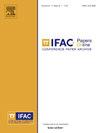在自动胰岛素输送(AID)系统中使用更快的胰岛素类似物的计算机评估,无需膳食公告
Q3 Engineering
引用次数: 0
摘要
自动胰岛素输送已成为1型糖尿病(T1D)血糖控制管理的标准护理,并已被证明可以显着改善整体血糖控制。然而,餐后高血糖仍然是一个挑战,即使有需要进餐通知的AID系统。快速和超快速作用的胰岛素类似物可以改善甚至预防餐后高血糖,现在可以用于研究和临床护理。然而,研究表明,当在这些系统中使用加速胰岛素时,调整AID系统的参数对于最大化效益是必要的。在这项工作中,在AIDANET(一种最先进的AID系统)中加速胰岛素的安全性和性能影响进行了计算机评估,以解决由未通知的膳食产生的餐后高血糖。利用药代动力学参数,包括在UVA/Padova 1型糖尿病模拟器中使用一种新型超快速胰岛素制剂。此外,两个计算机场景被用来评估自动胰岛素递送作为自适应网络(AIDANET)的性能,具有(i)更快的胰岛素类似物和(ii)更浓缩的配方。结果表明,AIDANET内置的自适应能力使其能够调整其攻击性,以适应更快的PK和更浓缩的配方,从而在临床上显著改善血糖控制结果,并最大限度地提高替代配方的益处。本文章由计算机程序翻译,如有差异,请以英文原文为准。
In-silico Assessment of Using Faster Insulin Analogs in Automated Insulin Delivery (AID) Systems Without Meal Announcement⁎
Automated Insulin delivery has become standard of care for managing glycemic control in Type 1 Diabetes (T1D), and has been shown to dramatically improve overall glycemic control. However, postprandial hyperglycemia remains a challenge, even with AID systems that require meal announcements. Rapid- and Ultra-rapid-acting insulin analogs that could improve or even prevent postprandial hyperglycemia are now available for both research and clinical care. However, it has been shown that adjusting AID system’s parameters is necessary for maximizing benefits when using accelerated insulins within these systems. In this work, the safety and performance effect of accelerating insulin within AIDANET, a state-of-the-art AID system is evaluated in-silico to address postprandial hyperglycemia generated by unannounced meals. Pharmacokinetic parameters are leveraged to include the use of a novel ultra-rapid insulin formulation within the UVA/Padova Type 1 Diabetes simulator. Additionally, two in-silico scenarios are used to assess the performance of Automated Insulin Delivery as Adaptive NETwork (AIDANET) with (i) faster insulin analogs and (ii) more concentrated formulations. Results show that AIDANET’s built-in adaptive capabilities allow it to adjust its aggressiveness to accommodate faster PK and more concentrated formulations, achieving clinically significant improvements in glycemic control outcomes and maximizing the benefits of alternative formulations.
求助全文
通过发布文献求助,成功后即可免费获取论文全文。
去求助
来源期刊

IFAC-PapersOnLine
Engineering-Control and Systems Engineering
CiteScore
1.70
自引率
0.00%
发文量
1122
期刊介绍:
All papers from IFAC meetings are published, in partnership with Elsevier, the IFAC Publisher, in theIFAC-PapersOnLine proceedings series hosted at the ScienceDirect web service. This series includes papers previously published in the IFAC website.The main features of the IFAC-PapersOnLine series are: -Online archive including papers from IFAC Symposia, Congresses, Conferences, and most Workshops. -All papers accepted at the meeting are published in PDF format - searchable and citable. -All papers published on the web site can be cited using the IFAC PapersOnLine ISSN and the individual paper DOI (Digital Object Identifier). The site is Open Access in nature - no charge is made to individuals for reading or downloading. Copyright of all papers belongs to IFAC and must be referenced if derivative journal papers are produced from the conference papers. All papers published in IFAC-PapersOnLine have undergone a peer review selection process according to the IFAC rules.
 求助内容:
求助内容: 应助结果提醒方式:
应助结果提醒方式:


